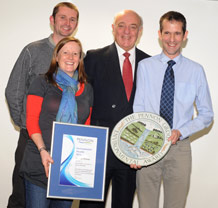
University of Exeter scientists and other stakeholders have collected two awards for environmental monitoring projects
Double win for water research projects
Two prestigious awards have been presented to projects in which University of Exeter scientists are helping to develop groundbreaking methods to monitor the success of restoration of the South West’s upland peatlands.
The accolades are from two separate award ceremonies, in evidence of widespread recognition of the quality of the work, which involves experts at the University of Exeter working with South West Water and other stakeholders in the natural environment sector.
“Upstream Thinking” is a programme to improve precious landscapes which are crucial to the supply of water. It has won the Environment Award at the Utility Industry Achievement Awards, known as the “Oscar” for the sector. The University team working on this project is led by Professor Richard Brazier, and includes expertise from Dr Karen Anderson, a team of PhD students, technicians and research fellows. They have been instrumental in advising South West Water and project partners on the best approaches for monitoring ecosystems and their hydrological functioning. The team has been installing monitoring equipment and collecting data from the mires of Exmoor and Dartmoor and the Culm grasslands on North Devon before restoration takes place. The data they collect will provide a baseline for current conditions before the sites are restored in coming years.
A second related project has been named overall winner in the Pennon Environmental Awards. The work involves groundbreaking use of small unmanned aircraft to collect photographic data to monitor the catchments used in the Upstream Thinking programme. The scheme is led by Dr Karen Anderson of the University of Exeter’s Environment and Sustainability Institute, in collaboration with South West Water and Quest UAV Ltd. Dr Karen Anderson, who collected the Pennon award, said: “We are the first people to use unmanned aircraft to survey Exmoor in this way, and I’m thrilled that this project has been recognised with an award. We want to use this data to understand the effects of restoration on the spatial patterns of vegetation and water in these degraded environments.”
Pennon Chairman Ken Harvey said the award gives staff and partners a chance to demonstrate their commitment to the environment. He said of the small unmanned aircraft monitoring project: “The judges commended this innovative technique and felt this could be applied by different industries, nationally and globally.”
The University of Exeter’s Professor Richard Brazier, who leads the monitoring work on the ground at these important sites, said: “Both of these awards are for interconnected projects which are contributing to a spatial understanding about the impact of restoration on peatland functioning. Peatlands on Exmoor and Dartmoor and further afield feed into the majority of the region’s water supply network. These are rare ecosystems which have been degraded over centuries of moorland reclamation, agricultural drainage and peat cutting. Now, the importance of these scarce ecosystems in storing water and controlling water supplies to downstream users is widely appreciated, and Upstream Thinking brings together a range of partners to restore them, both through blocking drainage ditches and seeking to change land management to preserve them into the future. The University of Exeter and our partners are extremely proud of these awards, which are evidence of our world-class research and the significant contribution we are making to improve the environment of the South West.”
Date: 15 December 2012
